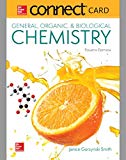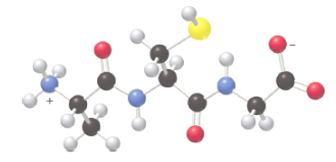
Connect One Semester Access Card for General, Organic, & Biological Chemistry
4th Edition
ISBN: 9781260194654
Author: Janice Gorzynski Smith Dr.
Publisher: McGraw-Hill Education
expand_more
expand_more
format_list_bulleted
Concept explainers
Textbook Question
Chapter 21, Problem 45P
What amino acids are formed by hydrolysis of the tripeptide depicted in the ball-and-stick model? 
Expert Solution & Answer
Want to see the full answer?
Check out a sample textbook solution
Students have asked these similar questions
Please correct answer and don't used hand raiting
9. The following reaction, which proceeds via the SN1/E1 mechanisms, gives three alkene products (A, B,
C) as well as an ether (D). (a) Show how each product arises mechanistically. (b) For the alkenes,
determine the major product and justify your answer. (c) What clues in the reaction as shown suggest
that this reaction does not go by the SN2/E2 mechanism route?
(CH3)2CH-CH-CH3 CH3OH
1
Bl
CH3OH ⑧· (CH3)2 CH-CH=CH2
heat
H
⑥③ (CH3)2 C = C = CH3
© СнЗ-С-Снаснз
сна
(CH 3 ) 2 C H G H CH 3
оснз
Please Don't used hand raiting
Chapter 21 Solutions
Connect One Semester Access Card for General, Organic, & Biological Chemistry
Ch. 21.2 - In addition to the amino and carboxyl groups, what...Ch. 21.2 - Draw both enantiomers of each amino acid in...Ch. 21.2 - Which of the following amino acids is naturally...Ch. 21.3 - Draw the structure of the amino acid valine at...Ch. 21.3 - Identify the amino acid shown with all uncharged...Ch. 21.4 - Identify the N-terminal and C-terminal amino acid...Ch. 21.4 - Prob. 21.4PCh. 21.4 - Prob. 21.4PPCh. 21.4 - Prob. 21.5PCh. 21.4 - Prob. 21.5PP
Ch. 21.4 - Prob. 21.6PPCh. 21.5 - Prob. 21.6PCh. 21.6 - Prob. 21.7PCh. 21.6 - Prob. 21.8PCh. 21.6 - Prob. 21.9PCh. 21.7 - Why is hemoglobin more water soluble than ...Ch. 21.8 - Prob. 21.7PPCh. 21.8 - Prob. 21.11PCh. 21.9 - Prob. 21.8PPCh. 21.9 - Prob. 21.12PCh. 21.9 - Prob. 21.9PPCh. 21.9 - Prob. 21.13PCh. 21.10 - Prob. 21.14PCh. 21.10 - Prob. 21.15PCh. 21.10 - Prob. 21.16PCh. 21.10 - Prob. 21.17PCh. 21.10 - The nerve gas sarin acts as a poison by covalently...Ch. 21.10 - Prob. 21.19PCh. 21.10 - Explain why the proteins involved in blood...Ch. 21 - The amino acid alanine is a solid at room...Ch. 21 - Why is phenylalanine water soluble but...Ch. 21 - Draw the structure of a naturally occurring amino...Ch. 21 - Draw the structure of a naturally occurring amino...Ch. 21 - For each amino acid: [1] draw the L enantiomer in...Ch. 21 - For each amino acid: [1] draw the L enantiomer in...Ch. 21 - Draw both enantiomers of each amino acid and label...Ch. 21 - Which of the following Fischer projections...Ch. 21 - For each amino acid: [1] give the name; [2] give...Ch. 21 - For each amino acid: [1] give the name; [2] give...Ch. 21 - (a) Identify the amino acid shown with all...Ch. 21 - Prob. 32PCh. 21 - Prob. 33PCh. 21 - Draw the structure of the neutral, positively...Ch. 21 - Locate the peptide bond in the dipeptide shown in...Ch. 21 - Label the N-terminal and C-terminal amino acids in...Ch. 21 - Melittin, the principal toxin of bee venom,...Ch. 21 - Cobratoxin is a neurotoxin found in the venom of...Ch. 21 - (a) Draw the structure of the two possible...Ch. 21 - (a) Draw the structure of the two possible...Ch. 21 - For each tripeptide: [1] draw the structure of the...Ch. 21 - For each tripeptide: [1] draw the structure of the...Ch. 21 - Prob. 43PCh. 21 - For each tripeptide: [1] identify the amino acids...Ch. 21 - What amino acids are formed by hydrolysis of the...Ch. 21 - Prob. 46PCh. 21 - Prob. 47PCh. 21 - Draw the structures of the amino acids formed when...Ch. 21 - Prob. 49PCh. 21 - Prob. 50PCh. 21 - Prob. 51PCh. 21 - Trypsin is a digestive enzyme that hydrolyzes...Ch. 21 - What type of intermolecular forces exist between...Ch. 21 - What type of interaction occur at each of the...Ch. 21 - Which peptide in each pair contains amino acids...Ch. 21 - Decide if the side chains of the amino acid...Ch. 21 - Which type of protein structure is indicated in...Ch. 21 - Label each of the following diagrams as...Ch. 21 - Prob. 59PCh. 21 - Prob. 60PCh. 21 - Prob. 61PCh. 21 - Prob. 62PCh. 21 - Compare - keratin and hemoglobin with regard to...Ch. 21 - Compare collagen and myoglobin with regard to each...Ch. 21 - Prob. 65PCh. 21 - Prob. 66PCh. 21 - Describe the function or biological activity of...Ch. 21 - Describe the function or biological activity of...Ch. 21 - Prob. 69PCh. 21 - Prob. 70PCh. 21 - What class of enzyme catalyzes each of the...Ch. 21 - What class of enzyme catalyzes each of the...Ch. 21 - Prob. 73PCh. 21 - Prob. 74PCh. 21 - Prob. 75PCh. 21 - What kind of reaction is catalyzed by each of the...Ch. 21 - Prob. 77PCh. 21 - How will each of the following changes affect the...Ch. 21 - Prob. 79PCh. 21 - Prob. 80PCh. 21 - Prob. 81PCh. 21 - Prob. 82PCh. 21 - Prob. 83PCh. 21 - Prob. 84PCh. 21 - Prob. 85PCh. 21 - Prob. 86PCh. 21 - Why must vegetarian diets be carefully balanced?Ch. 21 - Prob. 88PCh. 21 - Sometimes an incision is cauterized (burned) to...Ch. 21 - Why is insulin administered by injection instead...Ch. 21 - Prob. 91PCh. 21 - The silk produced by a silkworm is a protein with...Ch. 21 - Explain the difference in the mechanism of action...Ch. 21 - Prob. 94PCh. 21 - Prob. 95CPCh. 21 - Suggest a reason for the following observation....
Knowledge Booster
Learn more about
Need a deep-dive on the concept behind this application? Look no further. Learn more about this topic, chemistry and related others by exploring similar questions and additional content below.Similar questions
- 7. For the following structure: ← Draw structure as is - NO BI H H Fisher projections (a) Assign R/S configuration at all chiral centers (show all work). Label the chiral centers with an asterisk (*). (b) Draw an enantiomer and diastereomer of the above structure and assign R/S configuration at all chiral centers (again, show all work). (c) On the basis of the R/S system, justify your designation of the structures as being enantiomeric or diastereomeric to the original structure.arrow_forwardDon't used Ai solutionarrow_forward1. For the following reactions, predict the major product. Show stereochemistry where appropriate. неу b) 7 HBr XV ROOR H₂504 c) N/ H20 H+2 d) ~ Pt c) f. MCPBA -> сна сла (solvent) (1)BH 3-THE (3) Надрон B177 H20 9)arrow_forward
- For the following reactions, predict the major product. Show stereochemistry where approarrow_forwardHow is Talu home quer in Org. Chemistry propose a 3-butanal prepared from ketone? complete reaction for this, (to start from the guignand Meagent. ②what pocubble products could be produced from the reaction of : CA₂ CH₂ CH₂ dil H.504 A CH3 1 OBCH₂OH Naz Cr₂ 07 12504 NazCD 4 CH3CH2 07 AzS04 H3C H3C CH3-C - C - Atz но но + H, CH3 07 > ⑦Colts C614501 + (215) 504 кон 4arrow_forwardRank the following compounds most to least acidic: a) О OH 요애 OH .OH flow flow О F F F F OH F b) Ha EN-Ha CI Ha F F CI Haarrow_forward
- a) b) Provide arrows to show the mechanisms and then predict the products of the following acid base reaction. Use pKas to determine which way the reaction will favor (Hint: the lower pka acid will want to dissociate) Дон OH Ha OH NH2 c) H H-O-Harrow_forwardMATERIALS. Differentiate between interstitial position and reticular position.arrow_forwardFor each of the following, indicate whether the arrow pushes are valid. Do we break any rules via the arrows? If not, indicate what is incorrect. Hint: Draw the product of the arrow and see if you still have a valid structure. a. b. N OH C. H N + H d. e. f. مه N COHarrow_forward
- Decide which is the most acidic proton (H) in the following compounds. Which one can be removed most easily? a) Ha Нь b) Ha Нь c) CI CI Cl Ha Ньarrow_forwardProvide all of the possible resonanse structures for the following compounds. Indicate which is the major contributor when applicable. Show your arrow pushing. a) H+ O: b) c) : N :O : : 0 d) e) Оarrow_forwardDraw e arrows between the following resonance structures: a) b) : 0: :0: c) :0: N t : 0: بار Narrow_forward
arrow_back_ios
SEE MORE QUESTIONS
arrow_forward_ios
Recommended textbooks for you
 General, Organic, and Biological ChemistryChemistryISBN:9781285853918Author:H. Stephen StokerPublisher:Cengage Learning
General, Organic, and Biological ChemistryChemistryISBN:9781285853918Author:H. Stephen StokerPublisher:Cengage Learning Organic And Biological ChemistryChemistryISBN:9781305081079Author:STOKER, H. Stephen (howard Stephen)Publisher:Cengage Learning,
Organic And Biological ChemistryChemistryISBN:9781305081079Author:STOKER, H. Stephen (howard Stephen)Publisher:Cengage Learning, Introductory Chemistry: An Active Learning Approa...ChemistryISBN:9781305079250Author:Mark S. Cracolice, Ed PetersPublisher:Cengage Learning
Introductory Chemistry: An Active Learning Approa...ChemistryISBN:9781305079250Author:Mark S. Cracolice, Ed PetersPublisher:Cengage Learning Chemistry for Today: General, Organic, and Bioche...ChemistryISBN:9781305960060Author:Spencer L. Seager, Michael R. Slabaugh, Maren S. HansenPublisher:Cengage LearningChemistry: Matter and ChangeChemistryISBN:9780078746376Author:Dinah Zike, Laurel Dingrando, Nicholas Hainen, Cheryl WistromPublisher:Glencoe/McGraw-Hill School Pub Co
Chemistry for Today: General, Organic, and Bioche...ChemistryISBN:9781305960060Author:Spencer L. Seager, Michael R. Slabaugh, Maren S. HansenPublisher:Cengage LearningChemistry: Matter and ChangeChemistryISBN:9780078746376Author:Dinah Zike, Laurel Dingrando, Nicholas Hainen, Cheryl WistromPublisher:Glencoe/McGraw-Hill School Pub Co World of Chemistry, 3rd editionChemistryISBN:9781133109655Author:Steven S. Zumdahl, Susan L. Zumdahl, Donald J. DeCostePublisher:Brooks / Cole / Cengage Learning
World of Chemistry, 3rd editionChemistryISBN:9781133109655Author:Steven S. Zumdahl, Susan L. Zumdahl, Donald J. DeCostePublisher:Brooks / Cole / Cengage Learning

General, Organic, and Biological Chemistry
Chemistry
ISBN:9781285853918
Author:H. Stephen Stoker
Publisher:Cengage Learning

Organic And Biological Chemistry
Chemistry
ISBN:9781305081079
Author:STOKER, H. Stephen (howard Stephen)
Publisher:Cengage Learning,

Introductory Chemistry: An Active Learning Approa...
Chemistry
ISBN:9781305079250
Author:Mark S. Cracolice, Ed Peters
Publisher:Cengage Learning

Chemistry for Today: General, Organic, and Bioche...
Chemistry
ISBN:9781305960060
Author:Spencer L. Seager, Michael R. Slabaugh, Maren S. Hansen
Publisher:Cengage Learning

Chemistry: Matter and Change
Chemistry
ISBN:9780078746376
Author:Dinah Zike, Laurel Dingrando, Nicholas Hainen, Cheryl Wistrom
Publisher:Glencoe/McGraw-Hill School Pub Co

World of Chemistry, 3rd edition
Chemistry
ISBN:9781133109655
Author:Steven S. Zumdahl, Susan L. Zumdahl, Donald J. DeCoste
Publisher:Brooks / Cole / Cengage Learning
Biomolecules - Protein - Amino acids; Author: Tutorials Point (India) Ltd.;https://www.youtube.com/watch?v=ySNVPDHJ0ek;License: Standard YouTube License, CC-BY